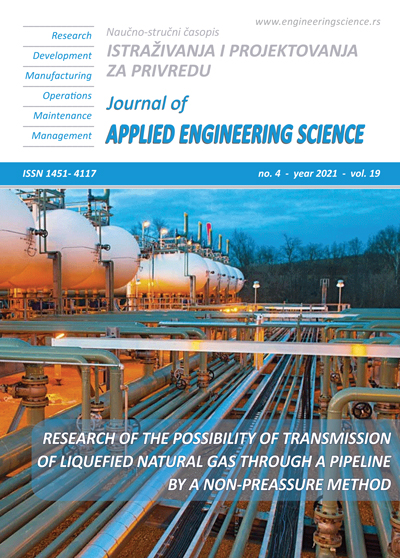OPTIMIZING A MULTIPRODUCT MANUFACTURINGSYSTEM WITH DELAYED DIFFERENTIATION, OUTSOURCING, EXPEDITED RATE, AND REWORK STRATEGIES
Multiproduct manufacturing with delayed differentiation, outsourcing, expedited rate, and rework strategies
Abstract
This study examines the effect of delayed differentiation, outsourcing, expedited fabrication rate, and rework strategies on optimal cycle-time decisions for a multi-item manufacturing system. Today’s manufacturing firms must simultaneously deal with externally increasing client multi-item requirements with rapid lead-time and high-quality products and internally on a limited capacity. This study is aimed at assisting manufacturers in meeting client needs in conditions of restricted-capacity and minimum total operating expenses, and adopts a delayed differentiation two-stage multiproduct manufacturing scheme to manage the end products’ commonality. The first stage produces all required common components, and the second stage fabricates individual finished goods. In both stages, we adopt the reworking of the inevitable nonconforming items produced to assure product quality. Furthermore, we implemented partial outsourcing of common parts’ batch and expedited the manufacturing rate of finished products to effectively reduce the uptimes in both stages. We explicitly developed a model to describe the characteristics of the problem. Mathematical analyses with optimization proved the cost function’s convexity and determined the cost-minimization rotation cycle policy. Finally, we numerically validated our model’s and results’ applicability and capability with a simulated example. Apart from creating a useful decision model, this study makes another important contribution to the existing literature in that its revelation of collective/individual effect of the manufacturing-relevant methods on the problem’s best-operating cycle policy and crucial performance indices helps manufacturers have better control over their operations and make effective and efficient managerial decisions.
References
2. Kuthambalayan, T.S., Mehta, P., Shanker, K. (2014). Integrating operations and marketing decisions using delayed differentiation of products and guaranteed delivery time under stochastic demand. European Journal of Operational Research, 237, 617-627.
3. Prataviera, L.B., Perotti, S., Melacini, M., Moretti, E. (2020). Postponement Strategies for Global Downstream Supply Chains: A Conceptual Framework. Journal of Business Logistics, 41, 94-110.
4. Zinn, W. (2019). A Historical Review of Postponement Research. Journal of Business Logistics, 40, 66-72.
5. Chiu, S.W., Zhao, Z-Y., Chiu, T., Chiu, Y-S.P. (2020). Combining the delayed differentiation policy and common parts’ partial outsourcing strategy into a multi-item FPR-based system. Journal of Applied Engineering Science, 18(2), 273-280.
6. Galizia, F.G., ElMaraghy, H.A., Bortolini, M., Mora, C. (2020). Product platforms design, selection and customisation in high-variety manufacturing. International Journal of Production Research, 58, 893-911.
7. Chiu, S.W., Lin, J-N., Wang, Y., Lin, H-D. (2020). Mathematical modeling for multiproduct EPQ problem featuring delayed differentiation, expedited rate, and scrap. International Journal for Engineering Modelling, 33 (3-4), 75-95.
8. Lee, Y-H., Wei, C-C., Chen, C-B., Tsai, C-H. (2000). Minimization of scrap and rework costs by process tolerances allocation. Engineering Optimization, 32 (5), 619-633.
9. Pasandideh, S.H.R., Niaki, S.T.A., Mirhosseyni, S.S. (2010). A parameter-tuned genetic algorithm to solve multi-product economic production quantity model with defective items, rework, and constrained space. International Journal of Advanced Manufacturing Technology, 49, 827-837.
10. Nobil, A.H., Afshar Sedigh, A.H., Tiwari, S., Wee, H.M. (2019). An imperfect multi-item single-machine production system with shortage, rework, and scrap considering inspection, dissimilar deficiency levels, and non-zero setup times. Scientia Iranica, 26, 557-570.
11. Zhetessova, G., Yurchenko, V., Nikonova, T., Zharkevich, O. (2019). The development of the computer-aided design system for production processes of component part machining for single-piece production and repair conditions. Journal of Applied Engineering Science, 17 (4), 599-609.
12. Ortiz-Servin, J.J., Castillo, A., Talavera, F. (2019). A new methodology to optimize operation cycles in a bwr using heuristic techniques. Journal of Applied Research and Technology, 17 (3), 155-162.
13. Chiu, Y-S.P., Sung, P-C., Chiu, V. (2020). A two-phase solution approach for a manufacturing-distribution problem with rework, outsourcing, and multi-shipment policy. Journal of Applied Engineering Science 18(4), 505-509.
14. Chiu, S.W., You, L-W., Sung, P-C., Wang, Y. (2020). Determining the fabrication runtime for a buyer-vendor system with stochastic breakdown, accelerated rate, repairable items, and multi-delivery strategy. International Journal of Industrial Engineering Computations, 11(4): 491-508.
15. Sung, C.S., Han, Y.H. (1993). Optimal buffer space for a periodic review production/inventory system with inventory-dependent production rate. International Journal of Production Economics, 29 (1), 11-25.
16. Lehtinen, U. (1999). Subcontractors in a partnership environment: a study on changing manufacturing strategy. International Journal of Production Economics, 60, 165-170.
17. Momme, J., Hvolby, H-H. (2002). An outsourcing framework: action research in the heavy industry sector. European Journal of Purchasing & Supply Management, 8(4), 185-196.
18. Soni, H.N., Patel, K.A. (2012). Optimal strategy for an integrated inventory system involving variable production and defective items under retailer partial trade credit policy. Decision Support Systems, 54 (1), 235-247
19. Akkermans, H., Van Oppen, W., Wynstra, F., Voss, C. (2019). Contracting outsourced services with collaborative key performance indicators. Journal of Operations Management, 65 (1), 22-47.
20. Toncovich, A.A., Rossit, D.A., Frutos, M., Rossit, D.G. (2019). Solving a multi-objective manufacturing cell scheduling problem with the consideration of warehouses using a simulated annealing based procedure. International Journal of Industrial Engineering Computations, 10 (1), 1-16.
21. Chiu, S.W., Huang, Y-J., Chou, C-L., Chiu, Y-S.P. (2020). Manufacturing runtime problem with an expedited fabrication rate, random failures, and scrap. International Journal of Industrial Engineering Computations, 11(1): 35-50.
22. Chiu, Y.-S.P., Zhao, Z.-Y., Chiu, S.W., Chiu, V. (2020). A vendor-buyer coordinated system featuring an unreliable machine, scrap, outsourcing, and multiple shipments. International Journal of Industrial Engineering Computations, 11(3), 341-358.
23. Dekker, H.C., Mooi, E., Visser, A. (2020). Firm enablement through outsourcing: A longitudinal analysis of how outsourcing enables process improvement under financial and competence constraints. Industrial Marketing Management, 90, 124-132.

